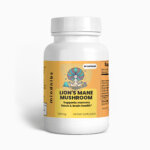
“Navigating Through Menstrual Problems: Can Supplements Ease the Symptoms?”
For many women, menstrual problems can be a frustrating and uncomfortable experience. From painful cramps to mood swings and insomnia, it can be difficult to navigate through the many symptoms that come with menstruation. While there are many over-the-counter remedies available, some women have turned to supplements to ease their symptoms. But can these supplements really help? In this article, we will explore some of the most common menstrual problems and the supplements that have been shown to be most effective in managing them. Whether you are looking for relief from menstrual pain, mood swings, or other symptoms, this article will provide you with the information you need to make an informed decision about which supplements may be right for you.
1. Understanding Common Menstrual Problems
As a woman, it is common to experience menstrual problems at some point in your life. Fortunately, many of these issues can be easily resolved with proper care and attention. Here are some of the most common menstrual problems and how to address them:
1. Amenorrhea: This is a condition where a woman doesn’t menstruate for several months. It can be caused by stress, weight loss, thyroid problems, or pregnancy. If you experience amenorrhea, it is important to see a doctor to rule out any serious medical conditions.
2. Dysmenorrhea: This is a condition where a woman experiences pain and cramping during her period. This can be caused by a variety of factors, including hormonal imbalances and endometriosis. The good news is that there are several treatment options available, including pain relief medication, hormonal birth control, and natural remedies like heat therapy.
3. Menorrhagia: This is a condition where a woman experiences heavy and prolonged bleeding during her period. This can be caused by hormonal imbalances, obesity, or polyps. Seeking medical attention is important if you experience menorrhagia, as it can lead to anemia and other health problems. Treatment options include medication, surgery, and hormonal birth control.
Remember, menstrual problems are common and nothing to be ashamed of. Seeking medical attention is important to ensure the best possible outcome. With proper care and attention, you can manage your menstrual problems and live a healthy and happy life.
2. The Benefits of Supplements for Menstrual Health
Ensuring good menstrual health is crucial for women and girls, and dietary supplements can provide numerous benefits. Here are some examples of the ways supplements can help:
- Relief from menstrual pain: Many supplements, particularly those containing omega-3 fatty acids, can soothe painful cramps associated with menstruation.
- Regulation of menstrual cycles: Some supplements, such as vitex agnus-castus, help regulate hormones and promote cycle regularity.
- Increase in iron levels: Women lose iron during their periods, and inadequate iron levels can lead to anemia. Iron supplements can help prevent this condition.
It is important to note that not all supplements are created equal. To ensure that you are reaping the maximum benefits, it is best to consult with a healthcare provider to determine which supplements are best for you. Additionally, supplements should never be used as a replacement for a healthy diet and regular exercise.
In conclusion, dietary supplements can be an effective way to support menstrual health. By easing discomfort, regulating cycles, and preventing nutrient deficiencies, supplements can make a significant difference in the lives of many women and girls. Just make sure to choose quality products and consult with a healthcare professional before incorporating them into your routine.

3. Essential Vitamins and Minerals for Hormonal Balance
Hormonal imbalance can cause a variety of health problems, but a diet rich in certain vitamins and minerals can help. Here are some of the essential nutrients you need to maintain hormonal balance:
- Vitamin D: This vitamin plays a significant role in hormone regulation and is necessary for the production of estrogen and progesterone. Foods rich in vitamin D include fatty fish, egg yolks, and mushrooms.
- B Vitamins: B vitamins, especially B6 and B12, are essential for the metabolism of hormones and can help reduce PMS symptoms. Foods that contain B vitamins include poultry, fish, eggs, and leafy greens.
- Magnesium: Magnesium is involved in over 300 enzymatic reactions in the body, including the production of sex hormones. Foods that contain magnesium include dark leafy greens, nuts, seeds, and whole grains.
In addition to these nutrients, other minerals and vitamins that can help maintain hormonal balance include:
- Iron: Iron is important for the production of estrogen and can help reduce symptoms of PMS. Foods that contain iron include red meat, poultry, fish, and leafy greens.
- Vitamin E: This vitamin can help reduce symptoms of PMS and support reproductive health. Foods rich in vitamin E include nuts, seeds, and leafy greens.
- Zinc: Zinc plays a role in the production of estrogen and progesterone and can help reduce symptoms of PMS. Foods that contain zinc include seafood, red meat, poultry, and beans.
If you’re not getting enough of these essential vitamins and minerals from your diet, consider taking a multivitamin or speak with a healthcare provider about other options for supplementation. By maintaining a balanced diet rich in these nutrients, you may be able to keep your hormones in balance and reduce the risk of health problems related to hormonal imbalance.

4. Herbal Supplements for Menstrual Pain Relief
Menstrual pain is an excruciating experience. Traditional medicine calls it dysmenorrhea, which causes persistent cramps and abdominal discomfort in females during the menstrual cycle. Herbal supplements have been proven to provide effective relief for menstrual pain, and below are some of the best options you should consider.
- Ginger: Gingerroot tea or tinctures are great at reducing inflammation and relieving menstrual pain. It also reduces muscle spasms and fights fatigue during menstruation.
- Chamomile: This herb has natural pain-relieving properties that can soothe menstrual cramps while calming anxiety and promoting restful sleep.
- Cramp Bark: As the name implies, this herbal supplement is effective in relieving menstrual cramps. It helps to reduce the severity of pain, boost menstrual flow, and control other symptoms of menstruation.
Herbal supplements offer a gentle and non-invasive treatment option for menstrual pain relief. They have far less side effects than traditional medications and are easy to obtain. We highly recommend that you try one or more of the above-listed ; you won’t regret it!
Remember, always consult with your healthcare provider before taking any herbal supplements, especially if you are pregnant, breastfeeding, or on any medications. Take care of your body, and don’t let menstrual pain slow you down.
5. Omega-3 Fatty Acids and their Effect on Menstruation
Omega-3 fatty acids are essential nutrients that play important roles in various biological processes in the body. One of the benefits of Omega-3 fatty acids is their positive effect on menstrual cycle. Studies have shown that supplementing with Omega-3 fatty acids can reduce menstrual pain, decrease the duration of menstrual bleeding and improve overall menstrual health.
The Omega-3 fatty acids EPA and DHA have anti-inflammatory properties that can help alleviate menstrual pain and cramps. In fact, a study published in the Journal of Reproductive Medicine found that women who consumed Omega-3 fatty acids had less menstrual pain compared to those who did not supplement with Omega-3s. Furthermore, another study showed that women who took Omega-3 supplements had a shorter duration of menstrual bleeding.
Omega-3 fatty acids are found in oily fish such as salmon, sardines, and mackerel, as well as nuts and seeds like walnuts and flaxseeds. However, if you’re not able to get enough Omega-3s from your diet, taking a daily supplement may be beneficial. Consider adding a high-quality Omega-3 supplement to your routine to experience its positive effects on your menstrual cycle.
6. Probiotics for Gut Health and Menstrual Irregularities
Probiotics are live bacteria and yeast that are good for one’s health, particularly the gut. They are known to build up the good bacteria in the intestines, leading to improved digestion, healthier gut, and a more robust immune system. Scientific research has found that probiotics may have a positive impact on menstrual irregularities. They may reduce inflammation, pain and bloating caused by menstruation, reduce premenstrual syndrome (PMS) symptoms, and improve hormonal balance.
If you are experiencing menstrual irregularities, probiotics can help you manage the condition naturally. Probiotics contain the Lactobacillus and Bifidobacterium strains that are known to have health benefits for women, especially those experiencing menstrual irregularities. By consuming probiotics, you are replenishing the good bacteria in your gut, which in turn can reduce inflammation, help to break down the hormones, and support the reproductive system.
Incorporating probiotics in your diet can be incredibly beneficial for your gut and menstrual health. Some natural and easy options for getting probiotics include fermented foods like miso and kimchi, yoghurt, kefir, and kombucha. You can also get probiotics in capsule form. To ensure you are getting the best results, look for high-quality probiotics supplements that contain Lactobacillus and Bifidobacterium strains. Make probiotics a part of your daily routine, and you may experience improved menstrual irregularities, better gut health, and general well-being.
7. Top Menstrual Supplements Recommended by Health Professionals
Health professionals recommend various menstrual supplements that can help regulate hormonal imbalances, reduce the severity of menstrual cramps, and improve overall menstrual health. To help you make informed choices, we’ve compiled a list of the top menstrual supplements recommended by experts.
1. Vitamin B-complex: B vitamins such as B6 and B12 can alleviate premenstrual syndrome (PMS) symptoms such as menstrual cramps, bloating, and mood swings. Foods rich in B vitamins include leafy greens, whole grains, and lean meats. However, taking a B-complex supplement before and during your period can ensure that you’re getting the recommended daily intake.
2. Magnesium: Magnesium is a mineral that plays a crucial role in muscle and nerve function. It’s also known to reduce muscle tension and relax the uterus, which can relieve menstrual cramps. Foods rich in magnesium include dark chocolate, nuts, and whole grains. However, if you’re not getting enough magnesium from your diet, consider taking a magnesium supplement.
3. Omega-3 fatty acids: Omega-3 fatty acids are essential fats that can help regulate hormone levels and reduce inflammation in the body. Research has shown that omega-3 supplements can reduce the severity of menstrual cramps and PMS symptoms. Foods rich in omega-3s include fatty fish, nuts, and seeds. However, you can also take an omega-3 supplement to ensure you’re getting enough of this crucial nutrient.
While these supplements can help alleviate menstrual symptoms, it’s important to consult with your healthcare provider before starting any new supplement regimen. They can help determine the appropriate dosage and ensure there are no interactions with other medications you may be taking. Incorporating these recommended supplements into your daily routine can help improve overall menstrual health and reduce the negative side effects of PMS.
By making informed nutrition choices and investing in quality supplements, women can learn to navigate their menstrual problems and alleviate their uncomfortable symptoms. Supplements can provide you with an opportunity to reduce the severity of menstrual issues and lead a healthier lifestyle. Now that you know how to excel in managing your menstrual problems and overcome uncomfortable physical and emotional symptoms, you can regain control of your menstrual health and find peace within it.

























